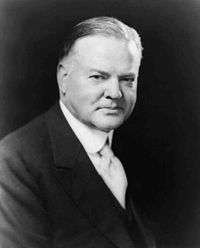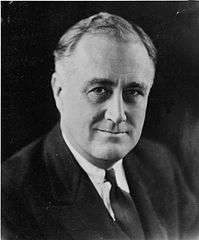United States presidential election in Vermont, 1932
| | ||||||||||||||||||||||||||||||||
| ||||||||||||||||||||||||||||||||
| ||||||||||||||||||||||||||||||||
|
| ||||||||||||||||||||||||||||||||
| County Results
Roosevelt—50-60%
Hoover—50-60%
Hoover—60-70% | ||||||||||||||||||||||||||||||||
| ||||||||||||||||||||||||||||||||
The 1932 United States Presidential Election in Vermont took place on November 8, 1932 as part of the 1932 United States Presidential Election which was held throughout all contemporary 48 states. Voters chose 3 representatives, or electors to the Electoral College, who voted for President and Vice President.
Vermont voted for the Republican nominee, incumbent President Herbert Hoover of California, over the Democratic nominee, Governor Franklin D. Roosevelt of New York. Hoover's running mate was incumbent Vice President Charles Curtis of Kansas, while Roosevelt ran with incumbent Speaker of the House John Nance Garner of Texas.
Hoover took 57.66% of the vote, to Roosevelt's 41.08%, a margin of 16.58%.
Vermont historically was a bastion of liberal Northeastern Republicanism, and by 1932 the Green Mountain State had gone Republican in every presidential election since the founding of the Republican Party. From 1856 to 1928, Vermont had had the longest streak of voting Republican of any state, having never voted Democratic before, and this tradition continued even in the midst of a nationwide Democratic landslide in 1932.
Vermont was one of only six states, four of them in New England, which voted to re-elect the embattled Republican incumbent Hoover, who was widely unpopular over his failure to adequately address the Great Depression. Vermont would ultimately be one of only two states (along with nearby Maine) that would reject FDR in all four of his presidential campaigns.
In terms of both vote share and margin, Vermont was the most Republican state in the nation. Vermont would weigh in as a whopping 34% more Republican than the national average in the 1932 election.
Hoover carried 11 of the state's 14 counties, breaking 60% in 7 of them. But the three northwestern counties of Vermont would become New Deal Democratic enclaves in an otherwise Republican state. In 1928, Democrat Al Smith had won Chittenden County, the state's most populous county, home to the state's largest city, Burlington. In 1932, Roosevelt would carry Chittenden County for the Democrats as Smith did in 1928, but also flip Franklin County and Grand Isle County into the Democratic column. All 3 counties would remain loyally Democratic in the elections that followed until Dwight Eisenhower's Republican landslide of 1952.
Results
| United States presidential election in Vermont, 1932[1] | |||||
|---|---|---|---|---|---|
| Party | Candidate | Votes | Percentage | Electoral votes | |
| Republican | Herbert Hoover | 78,984 | 57.66% | 3 | |
| Democratic | Franklin D. Roosevelt | 56,266 | 41.08% | 0 | |
| Socialist | Norman Thomas | 1,533 | 1.12% | 0 | |
| Communist | William Z. Foster | 195 | 0.14% | 0 | |
| N/A | Write-ins | 2 | 0.00% | 0 | |
| Totals | 136,980 | 100.00% | 3 | ||
References
- ↑ "1932 Presidential General Election Results - Vermont". Dave Leip's Atlas of U.S. Presidential Elections. Retrieved 2013-08-02.



.svg.png)
